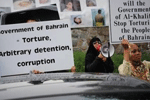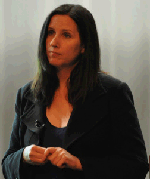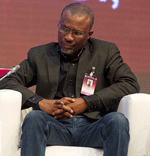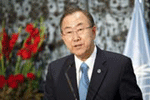Social Watch News
Published on Mon, 2013-09-30 20:22
Human rights organizations are deeply concerned about the unfair sentences which are likely to be given to 50 Bahraini political and rights activists who have been on trial since July 11 in what is known as the case of the February 14 youth. The activists have been charged with forming an illegal coalition, which the authorities hold responsible for the violence seen in the country during the crackdown on the popular democratic uprising in February 2011. The court has already adjourned for sentencing, even though the trial did not meet minimum standards of fairness and impartiality. Seeing the process as a show trial for the issuance of predetermined sentences, the defendants and their lawyers decided to boycott the trial session scheduled for today, September 29. |
Published on Mon, 2013-09-30 20:08
There are many ways to tell a story. For Trish Hennessy, Ontario director at the Canadian Centre for Policy Alternatives, one way is to look at the most searched word annually for the on-line Mirriam-Webster dictionary. Speaking at the Whitby Courthouse Theatre to a group of Durham-region New Democrats, Hennessy noted that in 2010 the most searched word was “austerity.” A year later it was “pragmatism.” In 2012 there was a tie between “socialism” and “capitalism. Clearly something is shifting,” she said. Many young people are being left out of the post-recession recovery and are now questioning the economic and political system that is denying them their place in society. |
Published on Mon, 2013-09-30 20:00
The Outcome document approved at the UN Special Event on Millennium Development Goals (MDGs) on 25 September 2013 in New York raises the right questions but answers too few of them. The document is meant to take stock of progress in implementing the goals and set parameters for the process to define a new generation of development goals by 2015. The failure to put accountability at its centre is widely recognised to be one of the deficiencies of the MDGs. Yet beyond a vague sentence reaffirming the importance of “promoting human rights, good governance, the rule of law, transparency and accountability at all levels,” the outcome document does not give accountability the priority attention it is due in the post-2015 development framework. |
Published on Mon, 2013-09-30 19:19
Third World Network-Africa (TWN Africa) has punched holes into the revised Ghana Investments Promotion Centre (GIPC) Bill, noting that there has been little change to the provisions. According to the non-governmental organization, the changes in the provisions did not offer any relief for domestic producers. |
| Source: . Published on Fri, 2013-09-27 20:04 |
|
Published on Fri, 2013-09-27 08:19
» |
Published on Thu, 2013-09-26 01:01
In a new comment the the Civil Society Reflection Group on Global Development Perspectives states that the SG’s report fails to address the core structural and macro-economic issues that shape the ability to implement and finance people-centered, ecologically sound policies and programs at all levels. The UN Secretary-General’s (SG) report “A life in dignity for all” (A/68/202) calls for a “new post- 2015 era […] a new vision and a responsive framework […] a universal agenda that requires profound economic transformations and a new global partnership.” Unfortunately that new vision and the new partnerships proposed by the SG derail our ability to meet the challenges we face today. |
Published on Wed, 2013-09-25 23:05
While the Arab region’s countries and peoples are busy with their crisis conditions as a result of the difficulties and challenges facing the democratic transition process, preparations continue for the UN General Assembly’s 68th summit in late September. The summit is expected to consider the political situation around the world, and the situation of the Arab region will be one of the most important cases on the agenda, particularly the crisis in Syria that has taken on international dimensions. On the one hand, the scope of blatant interference in the internal conflict by regional and international powers widened, and the Syrian Revolution turned into a regional arena of conflict with international dimensions due, on the other hand, to the use of internationally-banned weapons of mass destruction in many stages of the conflict (their recent use in residential areas led to the deaths of hundreds of innocent citizens). |
| Source: . Published on Wed, 2013-09-25 12:17 |
Published on Wed, 2013-09-25 00:00
The UN Secretary-General’s (SG) report “A life in dignity for all” (A/68/202) calls for a “new post-2015 era […] a new vision and a responsive framework […] a universal agenda that requires profound economic transformations and a new global partnership.” Unfortunately that new vision and the new partnerships proposed by the SG derails our ability to meet the challenges we meet today. |
SUSCRIBE TO OUR NEWSLETTER











